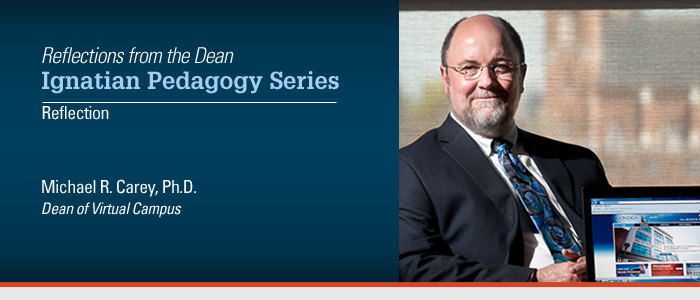Let’s continue our discussion of Ignatian Pedagogy, this time with a focus on the dynamic of Reflection. My presentation is based on a document entitled “Ignatian Pedagogy: A Practical Approach,” which was written by the International Commission on the Apostolate of Jesuit Education in 1993.
As I mentioned previously, the Ignatian pedagogical process begins with Context, so that we know as much as we can about the reality within which the learning takes place. From there, the learning itself always proceeds with Experience, whether that happens directly or vicariously, in real-time or through memory. The next step—the dynamic of Reflection—takes the perceived data and affective responses to the experience of the learner and organizes them to capture the meaning and essential value of the subject.
This happens by:
- More clearly understanding the truth being studied.
- Understanding the sources of the sensations or reactions I experience.
- Deepening my understanding of the implications of what I have grasped for myself and others.
- Achieving personal insights into events, ideas, truth, or the distortion of truth.
- Coming to some understanding of who I am and who I might be in relation to others.
Reflection happens best when it is shared, bringing learners into a community of learning that also includes the voice of the subject. A community that freely engages meaning without manipulation or indoctrination is key to the dialogic nature of Ignatian Reflection.
Transformational learning begins when, by reflecting on one’s experience, one begins to understand the essential value of a subject. From the perspective of Ignatian Pedagogy, that transformation withers unless it moves to the next stages, which are the dynamic of Action, critically examined through the dynamic of Evaluation. In future presentations I will share some background on these other dynamics of Ignatian Pedagogy.
Dr. Michael Carey
